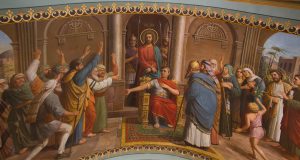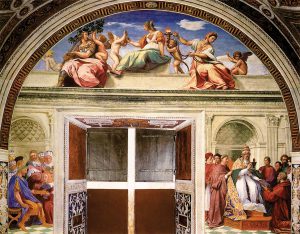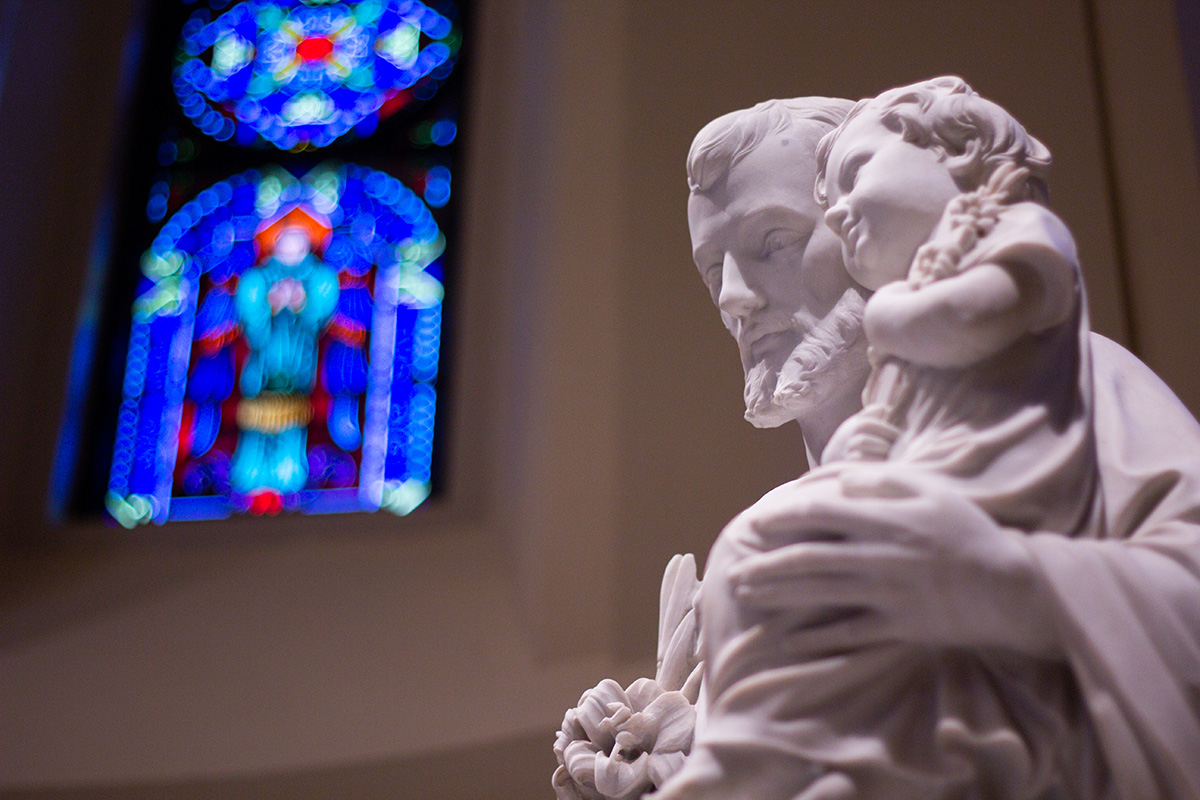
By Renae Kranz
Little is said about St. Joseph in the Bible. He himself says even less. In fact, he says absolutely nothing. And yet, he is the patron of the entire Catholic Church and of our diocese. Father Shane Stevens, pastor at St. Mary Parish in Dell Rapids, calls him the great saint of silence.
This quiet man let his actions speak for him in the way he cared for Mary and Jesus and in the way he answered the call the Lord had for his life. He left a courageous legacy of faith behind as an example for the rest of us to strive toward.
And he is a saint we can all turn to in times of trouble.
Patron of our diocese
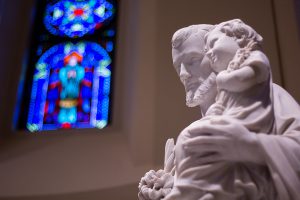
Besides being the patron of the Church as a whole, St. Joseph became the patron of our diocese when the mother church, the Cathedral of Saint Joseph, was completed in May of 1919. According to Father Stevens, his patronage is unique among the saints because St. Joseph cared for both the Son of God and our Blessed Mother Mary. He provided an example of perfect manhood even though he was not God incarnate like our Lord and was not given the graces of the Immaculate Conception as Mary was. St. Joseph had neither of those, says Father Stevens, and yet had abundant graces from God to fulfill his call.
“In many ways, this is the vocation of faithful manhood that is very much needed—to be radically in love with the Incarnation, but also to be truly devoted to the Immaculate Heart,” Father Stevens says. “And so I think those two aspects, for him, both for men and for women, disciples in general, the idea that you have this man who had such a magnificent encounter with the Incarnation and the Immaculate Conception all at once, and then had the great graces of being able to care for this Christ child and his mother. It’s profound. He absolutely has so much to offer.”
In order for Joseph to be the man God needed him to be for Jesus and Mary, He gave him the grace of justice. The Bible calls Joseph a “just man,” meaning he was a pious man who followed the Law and loved God. Father Stevens explains it also means he had the reputation of giving God and others their due. It gave him the ability to do what was right when hard things arose in his life.
One of those hard things was when he learned Mary was mysteriously with child. Rather than make a big production of it or put her in a position to be punished, he decided to divorce her quietly, to give her what he understood to be just in the context of the Law. Father Stevens says Joseph’s justice became mercy in this situation with Mary. At this point, God had mercy on Joseph by sending an angel to guide him to do His will and take Mary as his wife and Jesus as his son.
“Most of us don’t get an angel from God to tell us to knock it off and go this direction,” Father Stevens says. “The angels would be very busy if they had to come tell me every time I turn around I was on the wrong path, but most of us are not dealing with the Incarnation at that level. So this was a pretty profound experience for him.”
When you think about what Joseph was asked to do, he must have felt some fear and uncertainty. How could he be a father to the Son of God? How was he even worthy of it? But God gave him everything he needed beforehand. He gave him an open heart to do the will of God.
“God sends an angel to explain to him his role, and with great faith and great courage, he’s able to accomplish that,” Father Stevens says. “And I think for many fathers, for husbands, for young men in general, that sense of needing to be courageous, to have a mission and that it can be accomplished, is something that’s exceedingly attractive.”
In his encyclical letter on devotion to St. Joseph, “Quamquam Pluries,” Pope Leo XIII gives us an image of a father and son, a head of a family and a dutiful child.
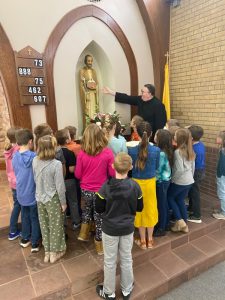
“And Joseph shines among all mankind by the most august dignity, since by divine will, he was the guardian of the Son of God and reputed as His father among men. Hence it came about that the Word of God was humbly subject to Joseph, that He obeyed him, and that He rendered to him all those offices that children are bound to render to their parents. From this two-fold dignity flowed the obligation which nature lays upon the head of families, so that Joseph became the guardian, the administrator, and the legal defender of the divine house whose chief he was. And during the whole course of his life he fulfilled those charges and those duties.”
One young father in our diocese has recently discovered St. Joseph and the benefits of a devotion to him. Matt Leedom, parishioner at Holy Spirit Parish in Sioux Falls, is a father of three little girls and devoted husband to wife Emily. St. Joseph’s example has been significant.
“Marriage and fatherhood has required immense faith, trust and courage from me,” Matt says. “I can’t think of a better example of these things carried out than in the life of St. Joseph. His example is a steady reminder of who I desire to be.”
An example for all
Could Joseph have known the influence he would have on men for thousands of years? Probably not, but it has been obvious in the lives of both Matt and Father Stevens.
For Matt, a devotion to St. Joseph is a bit new. He began noticing the Church dedicating this year to St. Joseph, the recent consecration of our diocese to him by Bishop DeGrood, and the consecration prayers written by Father Donald H. Calloway in his book “Consecration to St. Joseph: The Wonders of Our Spiritual Father.” He also felt a stirring in his own heart.
“As a young dad, images of him began to resonate with me in a new way and curiosity about his life began to grow,” Matt says. “The more I look at him, the more I want to know of him. And the more I know of him, the more I want to be like him.”
Matt’s middle name is Joseph and his father’s name is Joseph. Something strange had been happening with this saint for a while.
“If I’m being honest I never thought much of that until the past few years. Looking back, while I may not have been aware, I think St. Joseph has been pursuing me for a long time as my patron before I was pursuing him,” Matt says.
That’s a powerful statement and not an unusual one. Saints often seem to find the people who need them most.
Father Stevens traces his connection to St. Joseph to several moments in his childhood and teenage years. When his mother’s French Canadian family came to this country a couple generations before him, they brought with them a love and devotion to St. Joseph, and his mother and her family worked for the Sisters of St. Joseph in Concordia, Kansas. When he was young, the now-closed Church of St. Joseph in the countryside nearby provided his first experience of Joseph during Christmas Eve midnight Mass.
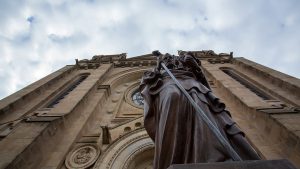
“St. Joseph plays such a prominent role in the nativity narratives, so I started making that connection, ‘Oh, this is a very special man,’” Father Stevens says. “My great-grandmother, my grandmother, they all had a lot of devotion to him, praying to him and having statues of him. So it was a really warm thought.”
The second memory that stands out for Father Stevens is a youth retreat where the priest there talked about how God is our Father and St. Joseph, in a particular way, can be a father to us as well. It helped him to know that besides his own father, whom he loved dearly, St. Joseph would take care of him as well. He could “go to Joseph.”
When he was a sophomore in high school, Father Stevens went on a pilgrimage to Fatima led by Father Robert Fox and encountered St. Joseph again. Father Fox talked to the group about Joseph, explaining that a devotion to him would help strengthen their desire for chastity and purity in their state of life. Father Stevens found himself very attracted to everything he learned
about this spiritual father.
Now as a priest, he’s put all the pieces together into a beautiful picture of the great saint of silence.
“I’ve always just been very moved by this idea of this man who took care of the Immaculate Conception and was in the presence of the Incarnation, and what a great grace that must have been,” Father Stevens says. “And that we, too, as sons and daughters of God can have that as well in the Eucharist, in adoration. I just think often what it must’ve been like for him to dwell upon and look upon the Christ child, God himself, to hold him. And that sense that Joseph, in all of his strength and all of his courage, had the tenderness of being able to hold God, and we can do that, too, in Holy Communion and our relationship with God and our care for others.”
Father Stevens goes to St. Joseph daily, asking him to intercede for him and praying in a particular way for protection. He also has a custom of lighting a perpetual candle in front of St. Joseph in his parish for big intentions for the parish and his parishioners.
He’s been a reliable intercessor for both men in times of need.
Patron of workers
St. Joseph is not only a patron to the Church and our diocese, but he is also the patron of workers. Since we know Joseph was a carpenter and worked tirelessly to support his family, he is a natural place for all kinds of workers to turn.

Matt has always felt an attraction to St. Joseph the Worker and often imagines him working in a wood shop. He realizes that might be an unusual image to think of first, but it comes from working alongside his own father and grandfather as he learned wood working from them.
“There was something in that time spent together that I learned more about what it means to be a man and a dad,” Matt says. “I think that’s the power of St. Joseph. He teaches us masculinity and fatherhood through his actions, not his words.”
Pope Pius XII established the Feast of St. Joseph the Worker on May 1, 1955, partly as a balance to the Communist idea of the worker as just a cog in a wheel. Joseph is a model of the dignity of work and its value to the human family. But Father Stevens says Joseph can also remind us that not everything in our lives should revolve around work. He often has to remind his parishioners to properly prioritize their work, especially if it’s being used as an excuse to miss important things like Mass or family time.
There will always be work to do, but we do our work for a reason, Father Stevens says: “the care of oneself, the care of one’s family, the care of neighbors, one’s just participation in society.” St. Joseph never loses track of what’s important in his life with Mary and Jesus.
“He doesn’t say to the angel, ‘Oh, no, I can’t take care of this situation with Mary because I have this table and chairs I’ve got to get finished. I can’t go to Bethlehem because I promised to make some barstools for this neighbor down the street, and I’ve got to get this done,’” Father Stevens says. “No, he keeps the perspective. So what Joseph says to us is there’s always going to be work. There’s always going to be things to be attended to, but it’s about the priority. I think the great gift of St. Joseph is that he reminds us of the priority: God first, God first, family, friends, neighbors, and always God first.”
We couldn’t have a more perfect example of work and putting priorities in the right order.
A saint for everyone
Father Stevens recommends St. Joseph as an intercessor to people for a variety of reasons. When a woman comes to him and is broken hearted, discouraged or frustrated with her husband, he tells her to “go to St. Joseph.”
He often encourages young men who might be struggling with pornography, masturbation or sins against the sixth commandment to “go to St. Joseph.” Rather than trying to get through it on their own, he sends them to the fatherly arms of the earthly father of Jesus.
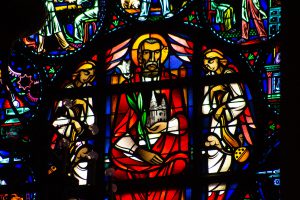
He says most people he sends to Joseph usually haven’t thought of turning to him but come back to him later to report how much consolation they received from St. Joseph’s intercession. He also recommends having a statue of St. Joseph in their home and asking him to be the patriarch of their home.
“We should take the example of him [St. Joseph] and just be faithful and courageous, which is a gift of the Holy Spirit. I have found him to be the go to saint over and over,” Father Stevens says.
Go to St. Joseph
The witness of St. Joseph is a powerful one for both men and women. Matt is seeing it more and more in his growing devotion.
“The ‘yes’ of St. Joseph to accept a life that he hadn’t planned for himself is a beautiful witness of faith in God’s plan. I think all of us could use more faith amidst a time and world that seems to have so much uncertainty,” Matt says.
Pope Pius IX declared St. Joseph Patron of the Universal Church in 1870. These words from his decree display the deep love the Church has for this most chaste spouse of Mary:
“Him whom countless kings and prophets had desired to see, Joseph not only saw but conversed with, and embraced in paternal affection, and kissed. He most diligently reared Him whom the faithful were to receive as the bread that came down from heaven whereby they might obtain eternal life.
“Because of this sublime dignity which God conferred on his most faithful servant, the Church has always most highly honored and praised blessed Joseph next to his spouse, the Virgin Mother of God, and has besought his intercession in times of trouble.”
Let us “go to Joseph” in our times of need.
Prayer Before Work to St. Joseph the Worker
O Glorious Saint Joseph, model of all those who are devoted to labor, obtain for me the grace to work in a spirit of penance for the expiation of my many sins; to work conscientiously, putting the call of duty above my natural inclinations; to work with thankfulness and joy, considering it an honor to employ and develop by means of labor the gifts received from God; to work with order, peace, moderation, and patience, never shrinking from weariness and trials; to work above all with purity of intention and detachment from self, keeping unceasingly before my eyes death and the account that I must give of time lost, talents unused, good omitted, and vain complacency in success, so fatal to the work of God.
All for Jesus, all through Mary, all after thy example, O Patriarch, Saint Joseph. Such shall be my watch-word in life and in death. Amen.
(Composed by Pope St. Pius X)

